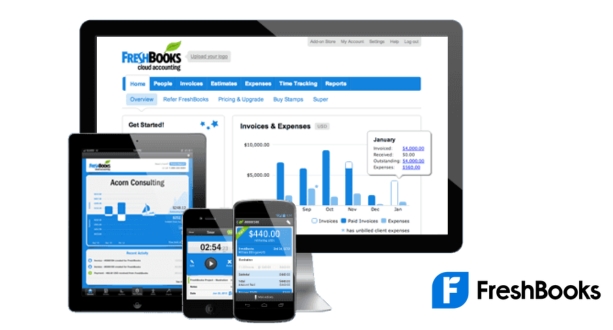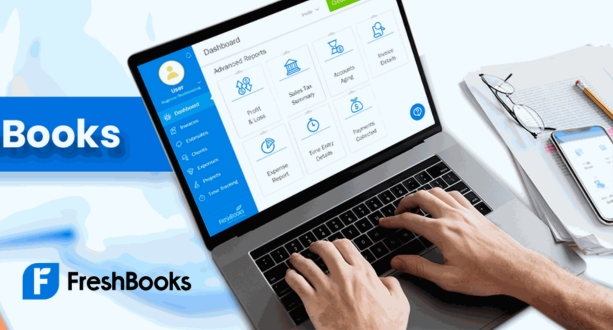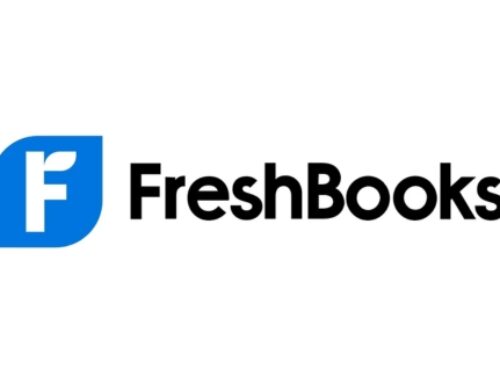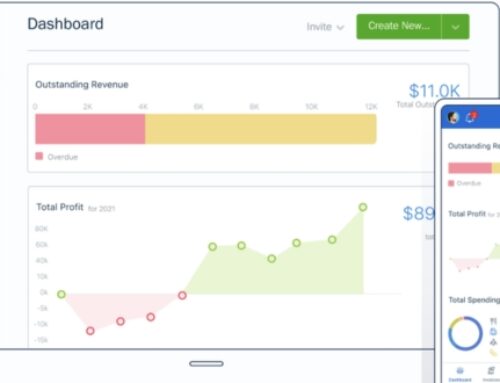Introduction of Fresh Books Expense Tracking and Reporting
In the fast-paced world of business, efficient financial management is crucial for the success of any organization. One aspect that plays a significant role in this domain is expense tracking and reporting. This process involves monitoring and recording all the expenses incurred by a business, providing a comprehensive overview of its financial health. In this context, FreshBooks emerges as a powerful tool, offering a user-friendly platform for businesses to streamline their expense tracking and reporting processes.
Background of FreshBooks:
FreshBooks is a cloud-based accounting software designed to simplify financial tasks for small businesses and freelancers. Founded in 2003, FreshBooks has evolved into a comprehensive solution that goes beyond basic accounting functionalities. Initially focusing on invoicing, the platform has expanded its features to include expense tracking, time tracking, project management, and more. FreshBooks has gained popularity for its intuitive interface and user-friendly design, making it accessible for individuals and small businesses seeking a hassle-free solution for their financial needs.
Importance of Expense Tracking and Reporting:
Expense tracking and reporting are essential components of financial management, offering businesses insights into their spending patterns and financial performance. Efficient tracking allows organizations to monitor where their money is going, identify cost-saving opportunities, and make informed decisions to improve overall financial health. Additionally, accurate expense reporting is vital for tax compliance, audits, and strategic planning. FreshBooks, with its automated expense tracking features and robust reporting capabilities, plays a pivotal role in helping businesses gain control over their finances and make data-driven decisions for sustainable growth. By emphasizing the importance of expense tracking and reporting, FreshBooks contributes to the financial success of businesses, both big and small.
Getting Started with FreshBooks:
FreshBooks is a user-friendly accounting software designed to simplify financial management for small businesses and freelancers. To begin your journey with FreshBooks, the first step is to create an account. Visit the FreshBooks website and follow the straightforward sign-up process. You’ll be required to provide essential information such as your business name, email address, and password. Once your account is set up, you gain access to a suite of tools that streamline invoicing, expense tracking, and financial reporting.
Setting up an Account:
After signing up for FreshBooks, take some time to customize your account settings to align with your business needs. Head to the account settings section, where you can input your business details, upload your logo, and set your preferred currency and language. Additionally, you can integrate your bank account and connect payment gateways to facilitate seamless transactions. The account setup process is crucial as it ensures that FreshBooks is tailored to your specific business requirements, providing a personalized and efficient experience.
Navigating the Dashboard:
Once your account is configured, you’ll find yourself on the FreshBooks dashboard—the central hub for managing your financial activities. The dashboard is intuitively designed, featuring key modules such as invoices, expenses, and reports. Familiarize yourself with the navigation menu, which typically includes tabs for clients, projects, and time tracking. The dashboard provides a real-time overview of your financial health, displaying critical metrics like outstanding invoices and total expenses.
Explore each section of the dashboard to fully understand the functionalities FreshBooks offers. For instance, the invoicing section allows you to create and send professional-looking invoices effortlessly. The expense tracking module simplifies the process of recording and categorizing expenses. Understanding the layout and features of the dashboard is fundamental to maximizing the benefits of FreshBooks, enabling you to manage your finances efficiently and focus on growing your business.
FreshBooks Expense Tracking Features
Manual Expense Entry:
FreshBooks offers a user-friendly platform for manual expense entry, allowing users to input expenses directly into the system. This feature is particularly useful for instances where expenses are incurred outside of electronic transactions or when dealing with cash expenditures. Users can easily input details such as the date, amount, and description of the expense, providing a comprehensive record for financial tracking.
Automatic Expense Import:
One of the standout features of FreshBooks is its automatic expense import functionality. This streamlines the expense tracking process by automatically pulling in transaction data from linked bank accounts or credit cards. This automation not only saves time but also minimizes the risk of manual data entry errors, ensuring accuracy in financial records. Users can review and approve these imported expenses with ease, maintaining control over their financial information.
Categorizing Expenses:
To enhance organization and reporting capabilities, FreshBooks enables users to categorize their expenses efficiently. By assigning expenses to specific categories, businesses can gain valuable insights into their spending patterns and budget allocation. This feature aids in creating detailed financial reports, facilitating informed decision-making. Whether it’s categorizing expenses by project, department, or type, FreshBooks offers flexibility to adapt to various organizational structures.
Receipt Attachment and Management:
FreshBooks recognizes the importance of maintaining a thorough record of receipts for accountability and compliance. The platform allows users to attach digital copies of receipts directly to corresponding expense entries. This not only reduces paperwork but also ensures that all relevant documentation is easily accessible. The receipt management feature is designed to simplify the audit trail, making it effortless for users to substantiate their expenses and comply with accounting and tax requirements.
FreshBooks provides a comprehensive suite of expense-tracking features that cater to both manual and automated processes. From capturing cash transactions to seamlessly importing electronic expenses, categorizing expenditures, and managing receipts, FreshBooks empowers businesses with efficient tools to maintain accurate and organized financial records.
Expense Reporting in FreshBooks
Expense reporting in FreshBooks is a streamlined and efficient process that allows users to gain valuable insights into their business expenditures. FreshBooks, a popular cloud accounting software, offers a comprehensive suite of reporting features that empower users to analyze their financial data with ease.
Overview of Reporting Features:
FreshBooks provides a robust set of reporting features designed to give users a clear understanding of their expenses. Users can access detailed reports on various aspects of their financial activities, including expense tracking, to make informed decisions. The reporting dashboard offers a snapshot of key metrics, such as total expenses, categorized spending, and trends over time. This overview serves as a valuable tool for businesses aiming to maintain financial health and make strategic decisions based on accurate data.
Customizing Reports:
One of the standout features of FreshBooks is its ability to customize reports according to the unique needs of each business. Users can tailor reports by selecting specific date ranges, expense categories, and other relevant parameters. This flexibility allows for a more granular analysis, enabling users to focus on specific aspects of their expenses. Whether it’s tracking a particular project’s costs or assessing the performance of a specific department, FreshBooks’ customizable reports provide the agility necessary for a detailed financial overview.
Generating and Exporting Reports:
FreshBooks simplifies the process of generating and exporting reports, making it easy for users to share or archive essential financial information. With just a few clicks, users can generate comprehensive reports that encapsulate their expense data in a digestible format. The export functionality supports various file formats, such as PDF or CSV, ensuring compatibility with different software and platforms. This feature not only facilitates seamless collaboration within a team but also simplifies compliance requirements by providing easily shareable, standardized reports.
FreshBooks excels in the realm of expense reporting by offering a user-friendly interface coupled with powerful customization options. Businesses can leverage these reporting features to gain a deeper understanding of their financial landscape, leading to better-informed decision-making and improved financial management. Whether you’re a small business owner or a financial professional, FreshBooks provides a reliable and efficient platform for expense reporting.
Integration with Banking and Credit Card Accounts:
Integration with banking and credit card accounts is a crucial feature for modern financial management systems. This functionality allows users to seamlessly connect their software with their bank and credit card accounts, facilitating the automatic import of financial transactions. By linking these accounts, users can gain a comprehensive overview of their financial activity in one centralized platform, eliminating the need for manual data entry.
Streamlining Transactions:
One of the primary benefits of integrating with banking and credit card accounts is the ability to streamline transactions. Instead of manually inputting each transaction, the system can automatically fetch and categorize transactions in real-time. This not only saves time but also minimizes the risk of human error. Users can quickly and efficiently track their income and expenses, gaining better control over their financial situation.
Real-time Data Sync:
Real-time data synchronization is a key aspect of financial management systems that integrate with banking and credit card accounts. This feature ensures that the financial data within the software is always up-to-date. As transactions occur, they are instantly reflected in the system, providing users with real-time insights into their financial standing. This immediate synchronization enhances accuracy and allows for timely decision-making based on the latest financial information.
Bank Reconciliation:
Bank reconciliation is simplified through integration with banking and credit card accounts. The system compares the user’s recorded transactions with the ones retrieved from the bank, highlighting any discrepancies or missing entries. This reconciliation process helps users identify errors, detect fraudulent activities, and ensure that the recorded financial data aligns with the actual transactions. By automating the reconciliation process, users can maintain accurate financial records and mitigate the risks associated with manual reconciliation. This feature contributes to the overall integrity and reliability of financial data within the system.
Advanced Features for Expense Management
Expense management tools have evolved to incorporate advanced features that streamline and enhance the overall process of tracking and controlling expenditures. One such feature is Mileage Tracking, which proves invaluable for businesses with employees who frequently travel for work. This functionality allows users to accurately log and calculate the distance covered during business-related journeys, providing a comprehensive overview of travel expenses. By automating mileage tracking, businesses can not only save time but also ensure precise reimbursement for employees, promoting transparency and accuracy in financial records.
Billable Expenses represent another advanced feature within expense management systems. This feature is particularly crucial for service-based businesses where professionals often incur expenses that can be directly billed to clients. With this functionality, users can easily identify and categorize expenses that are billable to clients, facilitating a seamless invoicing process. This not only enhances efficiency but also ensures that businesses are adequately compensated for all billable costs incurred on behalf of their clients, thereby optimizing revenue streams.
Project-Based Expenses add another layer of sophistication to expense management tools. In scenarios where businesses undertake various projects with distinct budgets and financial requirements, project-based expense tracking becomes essential. This feature enables users to allocate expenses to specific projects, providing a granular view of each project’s financial health. Businesses can monitor project expenses in real time, helping them stay within budgetary constraints and make informed decisions to optimize project profitability. This level of detail is particularly beneficial for project managers and finance teams seeking to maintain financial control and accountability across diverse project portfolios.
The integration of Mileage Tracking, Billable Expenses, and Project-Based Expenses into expense management tools reflects a commitment to enhancing functionality and addressing the nuanced needs of businesses. These advanced features not only contribute to operational efficiency but also foster transparency, accuracy, and financial control, making expense management a more sophisticated and tailored process for modern businesses.
Compliance and Security Measures
Ensuring Regulatory Compliance:
In today’s rapidly evolving regulatory landscape, businesses must navigate a complex web of rules and regulations to ensure compliance. For companies like FreshBooks, which deals with financial data and transactions, adherence to regulatory standards is of paramount importance. The term “compliance” refers to the company’s commitment to following all relevant laws, rules, and regulations governing its industry. This involves not only understanding the current regulatory environment but also staying abreast of any changes and adapting policies and practices accordingly.
FreshBooks is dedicated to ensuring regulatory compliance by regularly assessing and auditing its processes. This includes compliance with financial reporting standards, tax regulations, and data protection laws. The company often collaborates with legal experts and regulatory bodies to stay informed about any changes in compliance requirements. By doing so, FreshBooks aims to mitigate legal risks, build trust with customers, and uphold its reputation as a responsible and law-abiding organization.
Data Security in FreshBooks:
Data security is a critical aspect of FreshBooks’ operations, given its role in handling sensitive financial information. The term “data security” refers to the measures and protocols put in place to protect data from unauthorized access, disclosure, alteration, and destruction. FreshBooks employs a multi-faceted approach to safeguarding the data entrusted to its platform.
To begin with, FreshBooks implements robust encryption protocols to ensure that all data transmitted between users and its servers remains confidential. This includes the use of secure sockets layer (SSL) technology for encrypting data during transit. Additionally, the company employs advanced encryption algorithms to protect stored data, whether it be customer information, financial records, or any other sensitive data.
FreshBooks also invests in state-of-the-art firewall systems and intrusion detection/prevention systems to monitor and control network traffic. This helps prevent unauthorized access to the company’s systems and ensures that only authorized personnel can access sensitive data. Regular security audits and vulnerability assessments are conducted to identify and address potential weaknesses in the system.
Furthermore, employee training and awareness programs are integral to FreshBooks’ data security strategy. Staff members are educated on best practices, security protocols, and the importance of safeguarding sensitive information. This human element is crucial in preventing internal threats and ensuring that all employees understand their role in maintaining the company’s commitment to data security.
Both regulatory compliance and data security are fundamental pillars of FreshBooks’ commitment to providing a trustworthy and reliable platform for financial transactions. By staying compliant with regulations and employing robust security measures, FreshBooks aims to create a secure environment for its users and build lasting trust in the ever-evolving digital landscape.
Tips and Best Practices for Efficient Expense Tracking
Establishing Clear Expense Policies
Effective expense tracking begins with the establishment of clear and comprehensive expense policies. These policies should outline guidelines and rules regarding what constitutes a valid business expense, the proper documentation required, and the process for reimbursement. By setting clear expectations, employees are better equipped to adhere to the company’s expense management standards. It’s crucial to communicate these policies to all team members and ensure they have access to the necessary resources for clarification. Establishing a transparent framework not only promotes accountability but also streamlines the overall expense-tracking process.
Regularly Reviewing Reports
To ensure the accuracy and relevance of expense tracking efforts, regular and systematic reviews of expense reports are essential. By adopting a consistent schedule for reviewing reports, businesses can promptly identify any discrepancies, errors, or potential policy violations. This proactive approach allows for timely corrections and ensures that financial records are up-to-date. Regular reviews also provide an opportunity to analyze spending patterns, identify cost-saving opportunities, and make informed decisions for budget adjustments. Continuous monitoring and assessment contribute to a more efficient and reliable expense tracking system.
Utilizing Automation Features
In the era of digital advancements, leveraging automation features within expense tracking tools is a game-changer for efficiency. Automation can significantly reduce manual data entry, minimize errors, and accelerate the overall processing time. By integrating expense tracking software with other financial systems, businesses can create a seamless workflow, from expense submission to reimbursement. Automation not only saves time but also enhances accuracy and compliance by enforcing predefined rules. Investing in technology that offers robust automation features empowers organizations to streamline their expense-tracking processes, allowing employees to focus on more strategic tasks while maintaining financial integrity.
Conclusion:
In conclusion, FreshBooks stands out as a comprehensive solution for businesses seeking effective expense tracking and reporting. From its user-friendly interface to advanced reporting tools and collaborative features, FreshBooks empowers users to take control of their finances. By following the insights and best practices outlined in this guide, businesses can unlock the full potential of FreshBooks and achieve greater financial success.
Whether you’re a small business owner, a freelancer, or part of a larger enterprise, FreshBooks provides the tools you need to master expense tracking and reporting. As financial management plays a pivotal role in the success of any business, investing time and effort into understanding and leveraging the capabilities of FreshBooks is a step toward long-term financial stability and growth.









